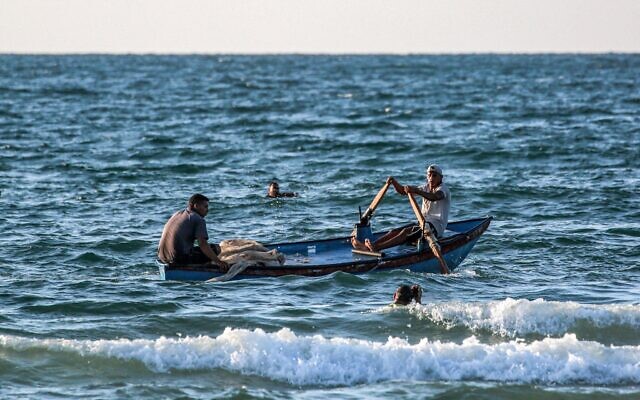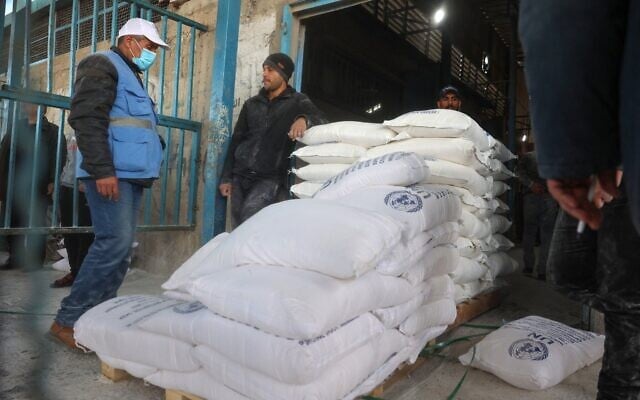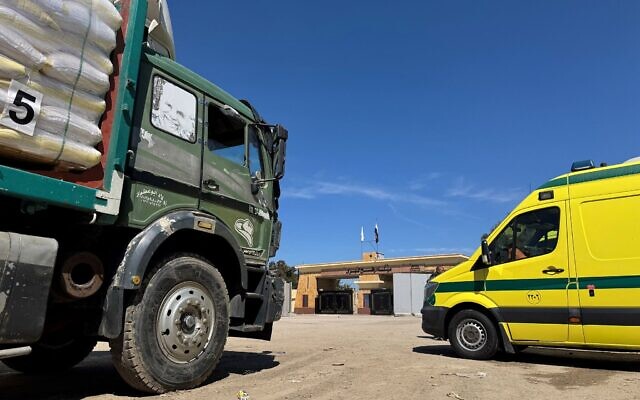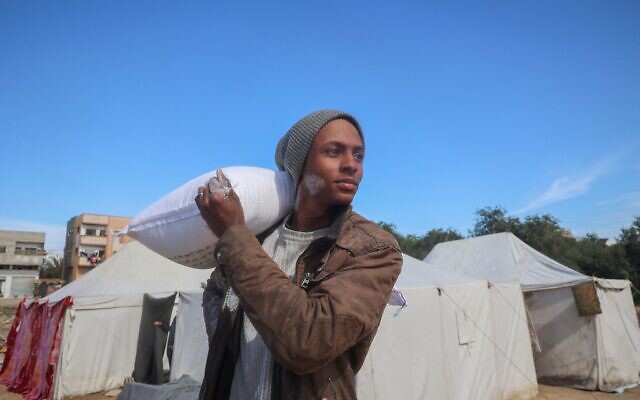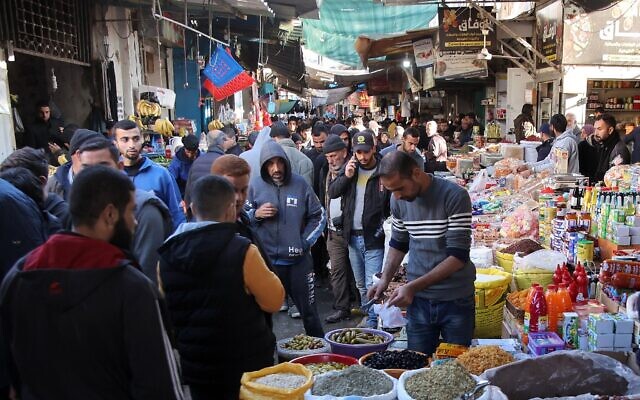


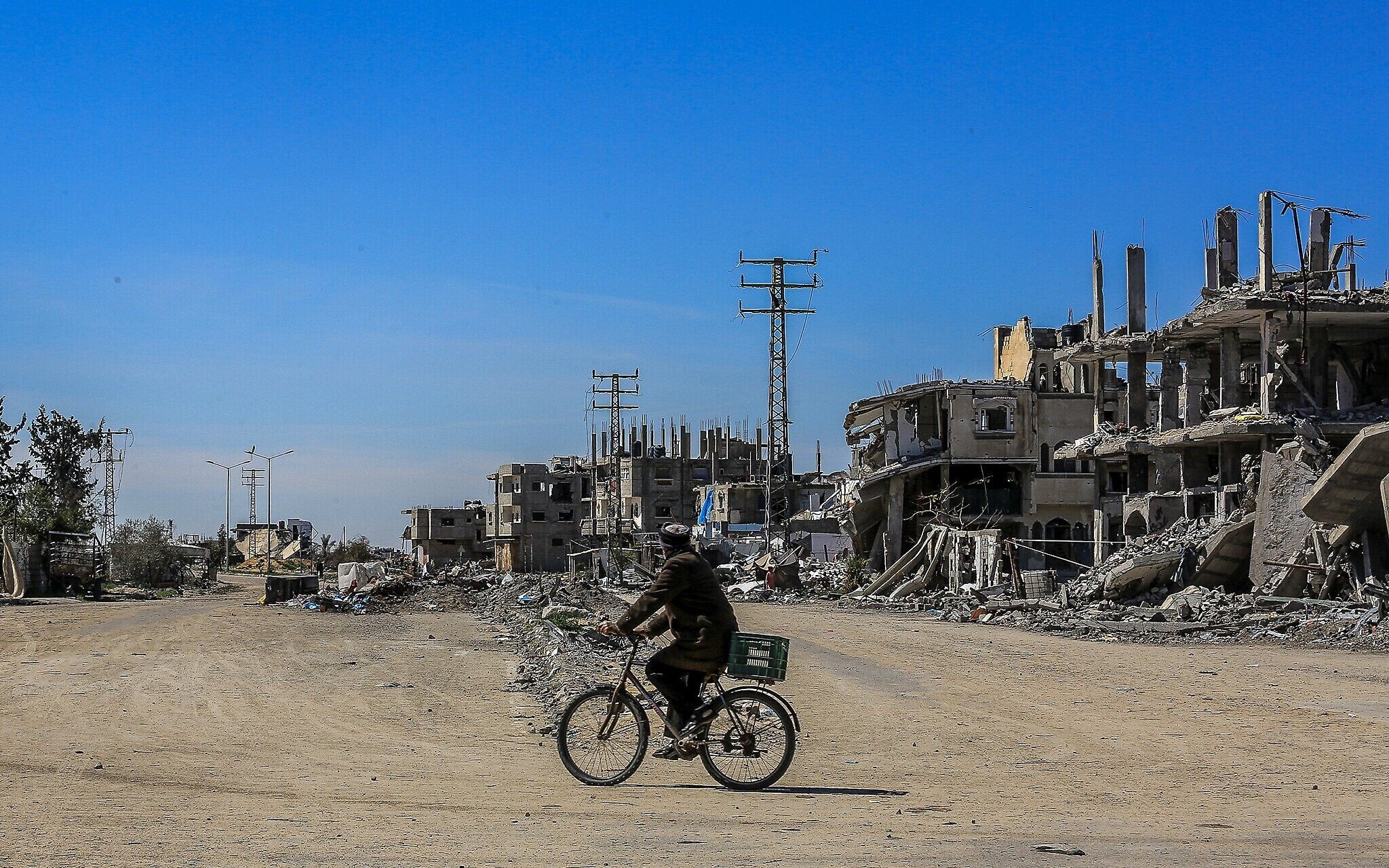
Two Palestinians were reportedly shot dead by Israeli troops in the Rafah area in the southern Gaza Strip Monday morning, as Jerusalem was said to be planning additional measures to pressure Hamas into concessions in negotiations to resume a recently expired hostage-ceasefire deal.
The Israel Defense Forces said troops opened fire on two suspects who approached them in the southern Gaza Strip and “posed an imminent threat.” Palestinian media later reported two dead in the incident.
Israeli forces are still deployed to a buffer zone along the Gaza border and the Egypt-Gaza border amid the ceasefire — the first phase of which lapsed Saturday — and the IDF has repeatedly warned Palestinians against approaching the area.
Residents said Israeli tanks stationed near the eastern and southern borders of Gaza intensified gunfire and tank shelling throughout the night, raising fears among the population that fighting could resume.
A Palestinian official with a group allied to Hamas told Reuters a state of alert had been declared among fighters.
The IDF also said Monday that it struck a suspicious vessel that crossed a maritime boundary set by the military off the coast of northern Khan Younis in the southern Gaza Strip earlier in the day.
Before the strike, warning shots were fired at the vessel, which the military said was identified as a threat. It was unclear whether the vessel sank or remained afloat.
The IDF has repeatedly warned fishermen, swimmers, and divers not to enter the sea along the entire Strip during the ceasefire.
Meanwhile, with negotiations on the continuation of the ceasefire deal deadlocked, the Kan public broadcaster reported that Israel is planning to keep piling pressure on Hamas to accept a new proposal extending the deal’s first phase and securing the release of all the hostages the terror group is holding, in addition to Sunday’s halt to aid entering the Gaza Strip.
Israel’s proposal would jettison the second phase framework that Israel and Hamas had agreed to for a new outline on releasing the remaining 59 hostages in two batches toward the beginning and end of the Ramadan and Passover holidays that run through March and until April 19. Hamas has accused Israel of violating the original deal and has insisted on continuing on to the second stage.
Kan reported that the next stages of Israel’s “maximum pressure” plan, said to have been drafted over the past few weeks, is to again move the Gazan population from northern Gaza to the territory’s south — as had been the case for most of the war — and later, if needed, cutting all electricity to the Strip.
The final planned measure is reportedly a full return to war, this time with billions’ worth of arms and military equipment the new US administration is sending Israel, including the heavy bombs withheld by the previous administration.
Israel has not directly threatened a return to war following the ceasefire’s lapse, instead reminding the public — and Hamas — that the initial agreement allows Israel to return to fighting after March 1 if negotiations are deemed ineffective.
Israel and Hamas were supposed to begin negotiations regarding the terms of phase two a month ago, but Israel refrained from doing so since that phase requires — in exchange for the release of the remaining living hostages — a full Israeli withdrawal from Gaza and a permanent ceasefire, which Prime Minister Benjamin Netanyahu has ruled out.
The ceasefire’s first phase saw 33 Israeli hostages released, eight of them dead, in exchange for nearly 2,000 Palestinian prisoners, including many convicted terrorists serving hefty jail sentences. Five Thai nationals held hostage in the Gaza Strip were freed separately during that period.
It also saw a surge in humanitarian aid to Gaza. Hamas accused Israel of trying to derail the deal Sunday, hours after the first phase had ended, and called Israel’s decision to cut off aid “a war crime and a blatant attack.”
Saudi Arabia also condemned the decision to block aid, dubbing it “blackmail” and a “flagrant violation of international law.” Mediators Egypt and Qatar accused Israel of violating humanitarian law by using starvation as a weapon.
Germany on Monday urged Israel to “immediately” stop blocking the aid, insisting that “unimpeded access for humanitarian aid to the Gaza Strip must be guaranteed at all times.”
“Granting or denial of humanitarian access is not a legitimate means of pressure in negotiations,” German Foreign Ministry spokesman Sebastian Fischer told a press briefing.
Germany, traditionally a staunch ally of Israel, also called on Hamas to release the hostages it was still holding, Fischer said.
“Hamas must now put an end to the suffering and humiliation of the remaining hostages and their families,” he said.
Fischer said Berlin was urging “both sides to return to the negotiating table and ensure the continuation of the ceasefire agreement.”
“All of this is indispensable for the release of further hostages, for improving the humanitarian situation of the people in Gaza and, in the long term, for the reconstruction of Gaza and a peaceful future in the region,” he added.
The European Union condemned what it called Hamas’s refusal to accept an extension of the first phase and said Israel’s subsequent aid block “risked humanitarian consequences.”
Brussels called for “a rapid resumption of negotiations on the second phase of the ceasefire.”
Saying the ceasefire has saved countless lives, the International Committee of the Red Cross said that “any unraveling of the forward momentum created over the last six weeks risks plunging people back into despair.”
UN humanitarian chief Tom Fletcher called Israel’s decision “alarming,” noting that international humanitarian law makes clear that aid access must be allowed.
UN Secretary-General António Guterres urged all parties to make every effort to prevent a return to hostilities in Gaza and called for humanitarian aid to flow back into Gaza immediately and for the release of all hostages, said spokesman Stéphane Dujarric.
Five nongovernmental groups asked Israel’s Supreme Court for an interim order barring the state from preventing aid from entering Gaza, claiming the move violates Israel’s obligations under international law: “These obligations cannot be conditioned on political considerations.”
The war has left most of Gaza’s population of over 2 million dependent on international aid. About 600 aid trucks had entered daily since the ceasefire began on January 19, easing fears of famine raised by international experts.
But residents said prices shot up as word of the closure spread. The Hamas-run Gaza interior ministry called on residents to provide information about merchants raising food prices in the wake of the new blockade, while the economy ministry initiated an effort to compel merchants not to increase prices.
Tamer al-Burai, a Gaza businessman, said that with shops suddenly empty, the price of a sack of flour had risen to NIS 100 ($28) from NIS 40. Prices for cooking oil, fuel, and vegetables had also surged.
“It is catastrophic and things might become worse if the ceasefire isn’t resumed or there is no intervention by the local authorities against greedy merchants,” he told Reuters via a chat app.
From the heavily destroyed Jabaliya urban refugee camp, Fayza Nassar said the closure would worsen dire conditions.
“There will be famine and chaos,” she said.
Salama Marouf, head of the Gaza government media office, urged Gazans not to panic, saying there was enough food in markets for at least two weeks.
“There are pressures to compel the occupation [Israel] to commit to the ceasefire agreement and to reopen the crossing,” said Marouf in a statement on Monday.
Under the ceasefire outline agreed to by Israel and Hamas on January 19, the remaining living hostages were to be released during the second stage of the deal, during which the IDF would complete a full withdrawal from Gaza. A third stage is also planned, during which the bodies of hostages held by Gazan terror groups would be released, the war would end, and the reconstruction of Gaza would begin.
US President Donald Trump’s Middle East envoy Steve Witkoff is expected to visit Israel soon, likely this week. Several Hebrew media outlets have reported that Jerusalem will likely hold off on renewing the fighting until the visit.

